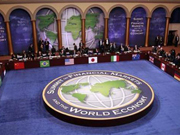UNI warns IMF that banking taxes should target high earners

UNI Global Union today said that any global bank taxes should not put a burden on low-level bank branch workers but rather tax only high-earning executives who make decisions that could put the global economy in jeopardy.
The International Monetary Fund has presented a two-tax proposal to G20 nations to fund the cost of any future financial bailouts.
The IMF plan, which it submitted to the governments of all the G20 countries, proposes that all financial institutions would pay a bank levy that would start out at a flat rate but would then be changed to reflect the riskiness of a particular institution’s business. They are proposing a second “Financial Activities Tax” (FAT) on bank profits and pay that would either:
· tax profits above a normal rate of return and pay above a certain level to discourage excessive risk taking and to ensure an equitable result; or
· tax all profits and pay to limit the size of the finance sector and to offset the fact that VAT tax regimes often exclude financial services.
UNI’s finance sector, which represents 3 million finance workers worldwide, supports the creation of a tax to ensure banks pay for bailouts and that top executives feel the pinch in their pocketbooks. But it would not support a tax that takes money from lower-level workers who do not bear any responsibility for the most recent financial crash.
The global union movement has been pushing for a tax on financial institutions. At the G20 meeting in Pittsburgh in 2009 UNI General Secretary Philip Jennings coined the term “fat cat tax.”
“This FAT tax should follow the lead of its name and target the fat cats whose high incomes and bonuses come even when they destroy the global financial system,” said UNI General Secretary Philip Jennings. “Bank staff do not see the hefty pay packages of the CEOs and other top executives. We will not support a tax on their earnings.”
The IMF plan pushes its FAT tax as an alternative to a Financial Transactions Tax, which would be applied to gross revenues in the finance sector, not net revenues.
The taxes would apply to insurance companies, hedge funds and other financial institutions to ensure that banks don’t try to reclassify their activities to escape the tax.
“We support the notion that banks pay for the havoc they wreaked on the global economy but it is not the workers in the branches who are at fault,” said Head of UNI Finance Oliver Roethig. “These workers are not responsible and we cannot support any plan that would make them pay for the mistakes of their bosses.”
The global trade union movement had pushed the idea of a Tobin Tax that would tax financial institutions that would levy a small tax on financial transactions on a global level to provide resources for public spending or finance development in developing countries and pay for any further clean-up of the industry.
“The original intention was to provide funding for economic development for impoverished nations,” Jennings said. This is still valid and UNI will press this point in future discussions with G20 government leaders.”

